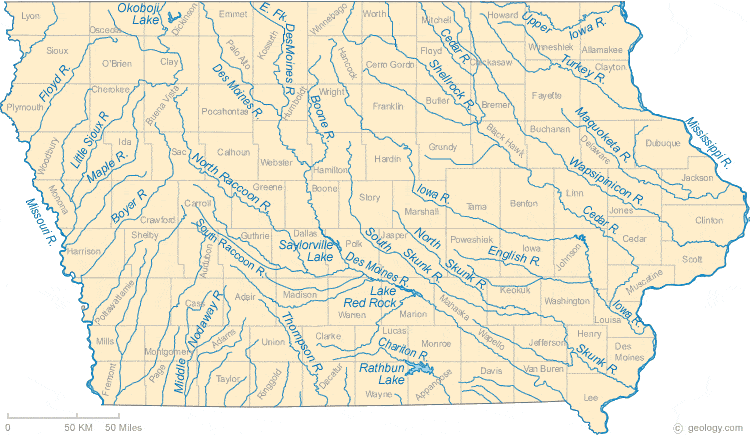44 Water Quality Policies Intro
lpaciga
Introduction:
Water quality management is an important part of the governance and regulation of the environment. Throughout the United States, every state is expected to ensure that bodies of water remain clean and usable for human and wildlife consumption. In the state of Iowa, water quality policies are especially impactful due to the large agricultural presence, the reliance of clean water in both urban and rural communities, and the importance of maintaining sustainable, healthy ecosystems of Iowa’s many rivers, lakes, streams, etc. The image below highlights the geographic distribution of Iowa’s primary water bodies. With so many rivers, lakes, and watersheds spread across both rural and urban areas, this visual underscores why water quality management is such a critical issue for the state. Although clean water quality policies are a large focus of the environmental agencies of Iowa, achieving goals and objectives of water quality are still hard to obtain sometimes. Achieving substantial and sustainable water quality goals requires managing challenges related to agricultural and industrial pollution, climate change impacts, and finding long-lasting solutions that are affordable and realistic. This explores Iowa’s water quality policies, examining the significance of their historical back

ground, current regulatory frameworks, key challenges the state faces, and ongoing efforts to improve water quality across the state. It provides a detailed analysis of the role of the Iowa Department of Natural Resources and the strategies the state employs to reduce pollution, preserve environments and habitats in water, and maintain access to safe drinking water for its citizens. Finally, it highlights the state’s collaboration with federal agencies, local governments, and private sector stakeholders to achieve its water quality goals.
Background of Water Quality Policies:
When looking at the foundation of water quality, it is important to explore the policies that support and manage water quality. Water quality policies are important for many reasons, including protecting the public health of communities and environments, regulating states and businesses, and promoting technological development and sustainability. In terms of protecting public health and environments, water quality policies work to reduce the pollutants and harmful substances in water, reducing the prevalence of water-borne diseases, keeping water safe to drink, and maintaining and keeping safe the natural habitats of wildlife in water. When speaking on regulatory effects, water quality policies ensure that everyone complies with federal laws, such as the Clean Water Act, and work towards making safe water cost-effective. Water quality policies have evolved significantly over the decades, driven by growing awareness of environmental issues and the increasing recognition of the importance of clean water for public health and biodiversity. The timeline shown provides a historical overview of key water quality policies at both the federal and state levels. It illustrates how environmental governance in Iowa has evolved over time in response to increasing awareness and scientific evidence about water pollution.
The Clean Water Act sets water quality standards for surface waters, controls pollutant discharges, and mandates regular monitoring of water quality across the country. In Iowa, state laws are aligned with federal standards but are also designed to address the specific environmental challenges the state faces. Some of these specific challenges are centered around agriculture, such as nutrient pollution from fertilizers and sediment runoff. Furthermore, sustainability and development are large parts of water quality policies: support data collection and examination of water sources, promote research and innovation of new technologies, and strive for sustainability to ensure future generations of communities have the same access to clean water. All of these goals and ideas reflect the importance of water quality policies and how impactful safe water is to a community. These reasons are not all, but many, of the reasons states and local organizations create different policies to ensure water quality for all members of society.
